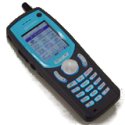First C/C++ binaries bidirectional debugger targets Linux
May 22, 2006 A U.K.-based start-up founded by two Ph.D's is shipping a bidirectional debugger for arbitrary Linux binary programs, including those written in C or C++. Undo Software says its UndoDB lets developers “reason backwards” from the point of failure, a technique said to greatly simplify debugging. (more…)
A U.K.-based start-up founded by two Ph.D's is shipping a bidirectional debugger for arbitrary Linux binary programs, including those written in C or C++. Undo Software says its UndoDB lets developers “reason backwards” from the point of failure, a technique said to greatly simplify debugging. (more…)
 [Updated May 31] — A live CD demontrating Qtopia Phone Edition (QPE) 4.1.1 will soon be available from Trolltech's website. Based on Knoppix Linux and the fluxbox window manager, the bootable CD includes software emulators that demonstrate both the touchscreen and keypad versions of the…
[Updated May 31] — A live CD demontrating Qtopia Phone Edition (QPE) 4.1.1 will soon be available from Trolltech's website. Based on Knoppix Linux and the fluxbox window manager, the bootable CD includes software emulators that demonstrate both the touchscreen and keypad versions of the…  Writer and network operator Kevin Milne has released another freely downloadable science fiction novel about a master hacker who creates the ultimate network penetration tool, a Sharp Zaurus PDA running Linux and special “Z4CK” software.
Writer and network operator Kevin Milne has released another freely downloadable science fiction novel about a master hacker who creates the ultimate network penetration tool, a Sharp Zaurus PDA running Linux and special “Z4CK” software.  DVEO used Linux to build a high-definition MPEG-2 4:2:2 transport stream encoder that compresses HD-SDI video from HD cameras in near real time, and encodes it for transmission over satellite uplinks or cable networks.
DVEO used Linux to build a high-definition MPEG-2 4:2:2 transport stream encoder that compresses HD-SDI video from HD cameras in near real time, and encodes it for transmission over satellite uplinks or cable networks.  LynuxWorks says L-3 Display Systems chose its Linux-like LynxOS-178 real-time OS for the cockpit display system in the F-35 Joint Strike Fighter (JSF). Key selection criteria included adherence to open standards, Linux compatibility, interoperability benefits of a POSIX API, and support for ARINC-653, according to the…
LynuxWorks says L-3 Display Systems chose its Linux-like LynxOS-178 real-time OS for the cockpit display system in the F-35 Joint Strike Fighter (JSF). Key selection criteria included adherence to open standards, Linux compatibility, interoperability benefits of a POSIX API, and support for ARINC-653, according to the…  Following its best year yet, Enea will continue its “transformation into a major platform provider,” offering customers “more Linux and open source options,” CEO Johan Wall told boardmembers at its annual general meeting (AGM) yesterday.
Following its best year yet, Enea will continue its “transformation into a major platform provider,” offering customers “more Linux and open source options,” CEO Johan Wall told boardmembers at its annual general meeting (AGM) yesterday.  Taiwanese embedded Linux specialist EzHomeTech says it is shipping version 3.0 of its SDK (software development kit) for IPTVs (Internet protocol TVs). The company's IPTV3.0 SDK uses MPEG4/H.264 compression, and supports video-on-demand, multi-cast, and, with an available add-on, Internet access, it says.
Taiwanese embedded Linux specialist EzHomeTech says it is shipping version 3.0 of its SDK (software development kit) for IPTVs (Internet protocol TVs). The company's IPTV3.0 SDK uses MPEG4/H.264 compression, and supports video-on-demand, multi-cast, and, with an available add-on, Internet access, it says.  Aplix, best known for its Java stacks for mobile phones, will add carrier-specific mobile phone software reference implementations (RIs) to its product line. Handset vendors will use its modular RIs to quickly create differentiated BTO (built-to-order) designs, it says.
Aplix, best known for its Java stacks for mobile phones, will add carrier-specific mobile phone software reference implementations (RIs) to its product line. Handset vendors will use its modular RIs to quickly create differentiated BTO (built-to-order) designs, it says.